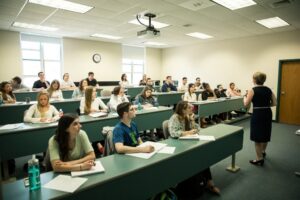by The Cowl Editor on February 8, 2018
Campus

by Lela Biggus ’18
Opinion Staff
College students should be an integral part of decision-making processes when it comes to hiring new teaching staff and assistant professors. Students are consumers of education and should therefore have some degree of control over what they are getting when they pay any amount of money, let alone $60,000 per year.
Multiple departments at Providence College are currently sifting through candidates for a variety of teaching positions, and every department has its own way of making sure student sentiment becomes part of the equation.
The English department welcomes student involvement in hiring decisions by inviting them to sample classes led by candidates and then requesting feedback. Comments from students are then referred to during search committee deliberations.
Dr. Bruce Graver, Chair of the English Department, commented, “We have never included students on the search committees, nor have students been invited to our departmental deliberations. Applications have confidential information in them, and our deliberations also are confidential, and our department has not been comfortable with sharing this kind of confidential information with students.”
The history department, in its search for an assistant professor of 20th century African American history, followed a similar procedure, inviting students to a candidate-taught lecture and requesting student feedback.
Assistant Chair of the history department Dr. Sharon Ann Murphy said, “The department has also invited students in African American Studies and leaders in Af-Am groups to attend the lecture and provide their feedback as well.”
Reaching out and including campus groups relevant to the position being filled displays thoughtful engagement with the whole campus, not just the department and its majors.
This kind of campus-wide engagement should be replicated because professors with expertise in certain areas are often called upon by campus organizations and classes within other majors to give lectures, speak on panels, or be a part of larger campus conversations.
The global studies department takes considerable measures to engage students with the faculty hiring process. Chairperson Dr. Nuria Alonso García commented, “Majors are viewed as colleagues and partners in decision making; their participation in department dialogues is expected, and their input is highly regarded and attended.”
Rather than offering optional lectures for students to attend, global studies brings candidates into capstone class times and embeds these lectures into course syllabi. Majors are also engaged in the process by attending informal lunches with candidates and guiding candidates on tours around campus.
Respect and consideration for student voices in decision making is extremely important and central to what Dr. Alonso García refered to as the “global studies student-driven democratic ethos.”
The more students that are involved in new faculty hiring, the better. Students should not only feel they are receiving the best education possible from faculty that are dedicated to their success, but also have the right to know and be reasonably satisfied with what they are paying for as consumers.
That is not to say that students who disagree with a potential hire on political or other matters should be able to reject that individual because they do not wish to be discomforted or challenged. Students often do complain of professors subtly pushing one agenda or another, but that is no grounds to provide incriminating feedback, nor should those things have sway in the decision making process.
However, students must feel satisfied with their professors in other ways: how professors communicate and relate with students, how they enhance student learning, how interesting and engaged they are, how organized they are, and if they make their expectations clear or not.
College students have been in school a long time. Students, especially upperclassmen, know the key difference between “he’s a great guy” and “he’s a great teacher.” This is a kind of wisdom unique to students that should be tapped into and taken seriously when decisions are made that will primarily and most directly impact student experience.